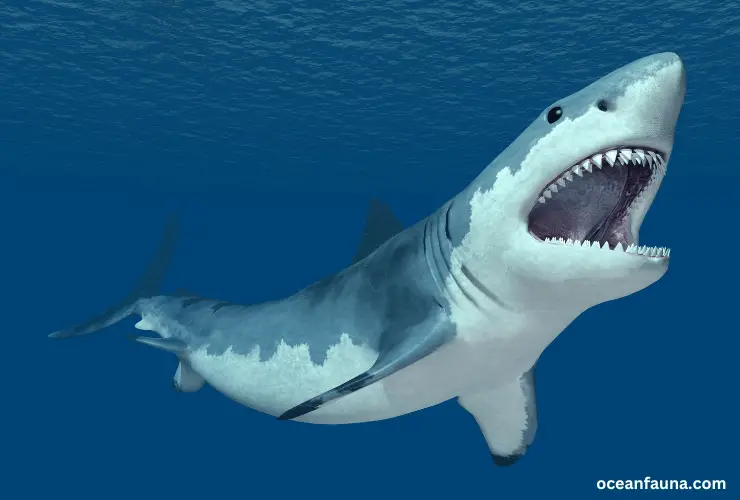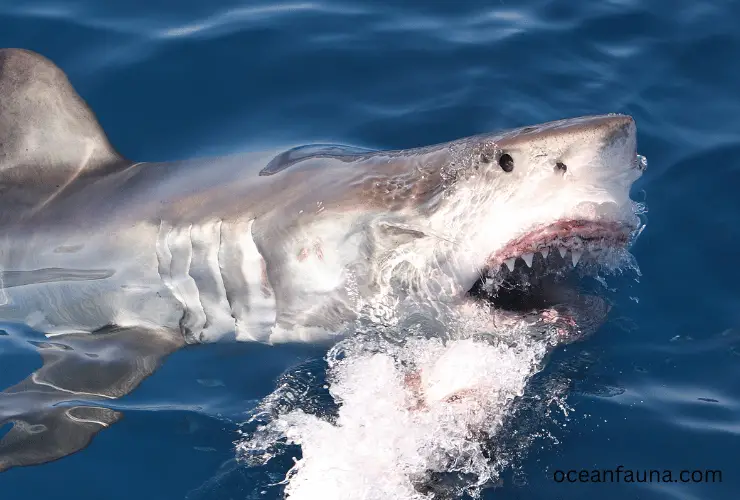Does it ever come to your mind that when living in the ocean, do sharks drink water?
No, sharks don’t drink water. However, it does take in some of the salty water from the ocean through its gills.
In this article, you learn more detail about this topic.
Do Sharks Drink Water?
Sharks have evolved a special adaptation to survive in the ocean, where drinking fresh water is impossible. Rather than drinking water, sharks absorb some seawater (and salt) through their gills. This allows them to maintain the correct salinity balance in their body and keep themselves hydrated.
The absorption of salt from the ocean can be aided by a special gland located within the shark’s digestive system that helps filter out excess salt from the seawater and excretes it overboard as waste.
How Does Water Absorption Work for Sharks?
The process starts with the shark inhaling seawater through its gills and then passing it over its specialized filtration system composed of multiple blood vessels and capillaries that work together to regulate the body’s salinity.
The walls of these vessels are covered with thin layers of cells called “cilia” that act as filters for suspended particles in the water, allowing only necessary substances such as oxygen, carbon dioxide, and hormones to pass through into the shark’s bloodstream.

Once inside the bloodstream, these essential substances are then transported throughout the shark’s body. Excess salt particles that were also present in seawater are filtered out by a specialized gland called an osmoregulatory gland which is found in most fish species but is especially well-developed in sharks.
This gland helps rid them of excess salt molecules drawn up from their gills before they reach other organs or tissues. By filtering out all unnecessary particles, this process maintains a healthy balance of electrolytes within the shark’s body while keeping it adequately hydrated without requiring any additional freshwater intake.
Overall Benefits of Water Absorption
This unique feature of sharks allows them to remain comfortably hydrated, even in extreme marine environments where freshwater sources may not be available or easily accessible.
It also offers them an evolutionary advantage over other fish species; since they don’t need to expend energy searching for freshwater sources, they can focus on other activities, such as finding food or mates instead.
This adaptation has allowed sharks to thrive and survive in almost every aquatic environment on Earth for more than 400 million years!
Are There Any Species of Shark That Is Known To Drink Water?
Whale sharks are one of the few species of shark that are known to drink water. In fact, they are a unique species in that they actively drink salt water, not fresh water. This is enabled by their specialized kidney, which is able to process the salt in the seawater they gulp in and then excrete it through their urine.
This ability enables whale sharks to filter much more water than other similar species, up to 1,500 gallons per hour. It also allows them to consume prey with greater efficiency, as they can gulp up to 10,000 gallons of water into their mouth at once while eating.
This immense intake of water is then expelled through their gills as filtered water containing the desired prey items remains within their mouth for consumption.
Not only does this ability allow whale sharks to find food more efficiently, but it also increases their control over where they travel, allowing them to choose the best locations for finding food based on salinity and nutrient levels in the waters.
Furthermore, due to the nature of their filtering process, there may be some secondary benefits, such as being able to remove parasites or other contaminants from local bodies of water, which would otherwise build up and negatively affect aquatic life.
Do Sharks Ever Get Thirsty?
Sharks do not get thirsty because they are able to extract moisture from food and the water around them. Sharks can take up the water that is around them through their mouth, which is full of tiny pores.
As discussed above, they do this by taking in small amounts of seawater and expelling it through their gills. This process helps them stay hydrated without having to actively search for freshwater sources.
Additionally, sharks have specially adapted kidneys that help conserve water so they can get as much out of each sip as possible.

It is also thought that some species of sharks, like the nurse shark, have differently adapted bodies that allow them to remain hydrated even when they are not actively seeking out a source of fresh or saltwater. This allows them to maintain a much more stable internal environment than other species, making it, so they don’t need to drink as often.
Do Sharks Need Water for Breathing?
Yes, sharks do need water for breathing. Sharks are aquatic animals, so their gills are adapted to take in oxygen from the surrounding water.
In order to survive and breathe, they must be constantly surrounded by a medium with sufficient oxygen content. Water has a much higher concentration of oxygen than air, so it is necessary for sharks to stay submerged in order to get enough oxygen.
Unlike humans, who use lungs to absorb oxygen from the air, sharks have specialized gills that extract dissolved oxygen from water during respiration. The gills are located on either side of the shark’s head and consist of many thin filaments known as ‘secondary lamellae,’ which extend outwards like thin branches.
A continuous stream of water passes over these filaments and absorbs dissolved oxygen molecules before being expelled from the body through an external opening called the ‘operculum.’
When a shark takes a breath of air, it does not absorb any oxygen – instead, this air helps push more water into its gills, allowing more oxygen to be extracted during respiration. This process is called ‘buccal pumping’ and occurs when a shark opens its mouth and gulps down large amounts of water, which then flows directly over its gill plates.
Do Sharks Ever Urinate?
Yes, sharks do urinate. Unlike mammals, which use a urinary tract to pass urea, sharks excrete ammonia and urea directly from their gills as part of a process called “ureotelism” or “ammonotelism.” This method of excretion helps to maintain the salt balance in their bodies by keeping the amount of sodium and chloride ions in their bodies relatively constant.
Sharks also lack a urinary bladder and, therefore, cannot store urine for later waste disposal as other land-dwelling animals can. Instead, they must continually flush out the nitrogenous waste from their bodies in order to keep it at an acceptable level.

Sharks have two kidneys that filter nitrogenous wastes, such as urea and ammonia, out of the bloodstream. The nitrogenous wastes accumulate in the pericardial cavity (the sac between the heart and stomach) before passing through to the gill slits, where they are released into the water around them.
The water acts as both an exit route for waste but also a medium through which ions can be reabsorbed back into their body to ensure the sodium-chloride balance is maintained.
In addition to these biological processes, sharks are capable of using energy sources such as glucose and fatty acids for fuel instead of relying on nitrogenous waste products as other animals would. This reduces the need for them to release nitrogenous waste from their bodies as often as other creatures do, thus reducing any impact on marine environments where they’re found.
The process of filtering nitrogenous wastes through the kidney plays an important role in keeping sharks’ internal systems balanced; without it, there would be no regulation on osmotic pressure or ion concentrations, resulting in serious health implications over time.
Furthermore, sharks have special physiological adaptations that allow them to maintain their salt balance even when living in waters with varying salinities, making them ideal ocean predators since they can survive in different aquatic habitats with ease!
Conclusion
Now you know, sharks don’t drink like us humans. They are special creatures that have evolved to subsist in the ocean and draw oxygen straight from the water. The method of separating nitrogenous waste helps them maintain a stable salt level critical for their lives in an ever-changing aquatic habitat. So now you know why sharks survive so well underwater!

